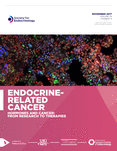Regulation of tumor cell plasticity by the androgen receptor in prostate cancer
- 1The Vancouver Prostate Centre, 2660 Oak Street, Vancouver, British Columbia, Canada V6H‐3Z6
2Department of Urologic Sciences, University of British Columbia, Vancouver, British Columbia, Canada
- Correspondence should be addressed to A Zoubeidi; Email: azoubeidi{at}prostatecentre.com
Abstract
Prostate cancer (PCa) has become the most common form of cancer in men in the developed world, and it ranks second in cancer-related deaths. Men that succumb to PCa have a disease that is resistant to hormonal therapies that suppress androgen receptor (AR) signaling, which plays a central role in tumor development and progression. Although AR continues to be a clinically relevant therapeutic target in PCa, selection pressures imposed by androgen-deprivation therapies promote the emergence of heterogeneous cell populations within tumors that dictate the severity of disease. This cellular plasticity, which is induced by androgen deprivation, is the focus of this review. More specifically, we address the emergence of cancer stem-like cells, epithelial–mesenchymal or myeloid plasticity, and neuroendocrine transdifferentiation as well as evidence that demonstrates how each is regulated by the AR. Importantly, because all of these cell phenotypes are associated with aggressive PCa, we examine novel therapeutic approaches for targeting therapy-induced cellular plasticity as a way of preventing PCa progression.
- Revision received 15 April 2015
- Accepted 27 April 2015
- Made available online as an Accepted Preprint 1 May 2015
- © 2015 Society for Endocrinology












